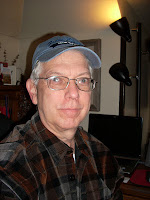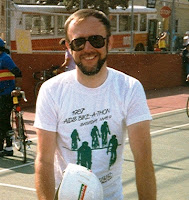If “to be held” is a goal, my relationship with the goal was one of slow, slow discovery. I have no memory of being held by my parents. I slept alone throughout my childhood since I was the only boy in the family. When as a little boy I went to my grandparents’ farm, I slept with Grandpa in his big Mission-style oak double bed. I recall he kidded me about having to build a wall of pillows to keep me from kicking him. I now wonder if he built the wall because I wanted to snuggle up to him, something he was uncomfortable doing. I’ll never know. One could say I am from a home in which touch was not withheld; it just wasn’t much of a factor, at least for this child.
In my early teen years I asked girls to school dances. I asked them because I liked to dance having been taught by my older sisters. In the junior high gymnasium we danced the Bop with its spins and fancy steps, the Twist with its aerobic benefits, and sometimes slow dances based on the Fox Trot. My favorites were several line dances the teachers taught us. I liked slow dances, too, for the holding and being held. Sounds pretty normal I guess. Anyway, as we danced, my ninth grade girlfriend rested her hand on my lower back, a fact that others noted and commented on. She was very short, and we danced very close. I had no objections. So we danced a lot that year hanging onto one another. Although at that time I wanted to dance with African American kids in line dances, it never occurred to me to dance with another boy. I had engaged in sexual things with grade school friends but none of my friends danced. I had never heard of boys dancing together let alone seen it. But had I imagined it, I’m sure I’d have wanted to dance with a boy, black or red, brown or white, or any other color of the rainbow.
In my mid-teens a new friend introduced me to a new kind of male-to-male sex that included the intimacy of kissing. I’d never been able to get myself to kiss a girl. I suppose I was still under the influence of my childhood groans during movie love scenes. I had no idea that the fact the hugging and kissing was between a female and a male could have anything to do with my lack of interest. Of course since I am music-sensitive, the introduction of sappy-sounding orchestral strings in such scenes may have really repelled me. But I readily took to kissing with my boyfriend. I didn’t realize that my kissing relationship with him was the kind that felt just right. I didn’t think in terms of either/or, either girl or boy. I just enjoyed what we did together and kept open my search for a girlfriend. In high school I dated several girls. We danced but didn’t fall in love.
Then I met a girl who with my grandmother was visiting our family. We attended a dance together. I danced close with this very sexy and enthusiastic young woman. In the car after we drove back home we held and kissed one another hungrily. She seemed to enjoy that I knew how to kiss even though I hadn’t been able to practice it for over two years, ever since my kissing boyfriend had left town. The next day she returned to her home a couple of counties away. I went off to college. I never saw her again.
I didn’t find anyone I wanted to kiss again for about a year. Then I met Myrna. We held hands. I put my arm around her. On the third date (the appropriate time according to discussions in the 1950s youth group I had attended) I worked up my courage to kiss her. We were parked late at night in the city zoo parking lot watching the lights caused by military maneuvers at nearby Fort Riley. The light show was nice, a novelty for her. Then I kissed her; she bit my ear. I thought, ‘This is something new,’ the effects of it shooting like lightning right down to my groin. I assumed she liked my kisses and maybe me. As it turned out she liked me just fine, but the bite was not a tease or a love bite; she was nervous. She would rather have only held my hand and continued liking her boyfriend back home (whom I never even heard about until years later). She’d rather have gone bowling, played volleyball, and skipped all the sexual, romantic things. But later, when I kissed her in front of several other students, right there in public, she opened herself to feelings she’d heard of in fairytales and assumed she had met her Prince Charming. In short, we married, had kids, and as a couple enjoyed living together with great intimacy—including a lot of touch, kisses, and sex—for years and years.
Still, I sought intimacy with a man. Ten years into the marriage I fell in love with him and basked in our occasional touch, our holding. Twenty years into the marriage I learned much more about my need to be held. My work partner, the senior minister with whom I’d served as an associate for seven years, died a sudden death early on a Sunday morning. I organized elders of the congregation to be at all the doors to greet folk and tell of the death as they arrived at the church. I was cast in the pastoral role for the congregation and realized that all I had learned about grief should be heeded for the whole group as well as for individuals. I didn’t have time to grieve for my personal loss. I bore the heavy responsibility, but I needed desperately to be held.
During the ensuing weeks, my wife and I kept to our normal patterns of intimacy. I held her. That was good. She remained responsive but somehow our pattern didn’t meet my needs. I eventually realized what I needed was to be held by my male lover, a man I’d been in love with for nearly a decade. He called by phone. I was pleased, but he did not come to the funeral. He didn’t come to see me in the following weeks. I didn’t think much about it at the time being too busy tending others. Still, I didn’t get held like I needed to be held. I seemed unable to ask anyone for what I needed. Eventually I did find a man to hold me. In receiving his fine care, I realized I had sought it because I was unwilling to call on my friend whose responses to me had always been unpredictable. I was needy beyond my past experiences.
I survived. I realized I needed a man-to-man relationship that would provide me more reliable and accessible contact. Eventually I found it. Then another. My needs pushed me into behaviors that spelled the ends of my marriage and career. I don’t say this as an apology for my behaviors or as an accusation against anyone. I tell it as description. I don’t expect other people to be more able to respond to life’s challenges any better than I. So I describe these experiences because the events and my responses revealed to me just how strong a need can be and how strong a pattern of behavior can be to prevent one from getting the need met.
I finally realized I needed to be held by the people I loved and who I knew loved me. I’m an old man now having entered a gay world where one can get sex rather easily, but the habits still restrict me; and of course there are the habits of other men as well as my own, habits that define asking and getting. They clarify experience, feelings, fears; mine and theirs. Sadly and stupidly I again find myself getting less holding than I believe I require.
I cannot write an ending to this story; I’m not yet dead! Who knows what the coming years may yet teach me about my need to hold and to be held?
Denver, 2012
About the Author
He also blogs at artandmorebyphilhoyle.blogspot












